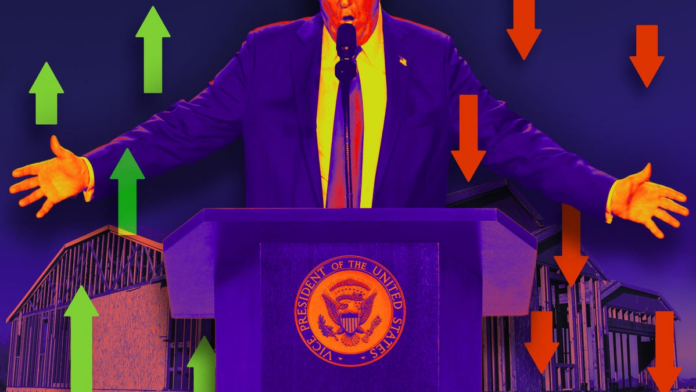It’s not easy to predict how a second Donald Trump presidency might affect the housing market. While much of what’s out there is speculation, we can look at his past policies and campaign promises to get a better idea of what might happen. For example, Trump has talked about lower mortgage rates, but for rates to drop to 3%, there would need to be a serious economic downturn — something no one wants.
Throughout my experience in real estate for over 20 years, I’ve seen firsthand how White House policies can impact affordability, lending and inventory. Some of the incoming administration’s potential moves might help buyers, while others could create new hurdles. Let’s break down what his policies could mean for you as a homebuyer or homeowner.
Could Trump’s policies help the housing market?
Here are some ways Trump’s policies might give the housing market a boost:
Lower taxes: Trump’s previous tax cuts under the Tax Cuts and Jobs Act in 2017 gave many US households more money back while raising taxes for others. However, it’s not quite that easy. If he extends or expands those cuts, it could help families save for a down payment. Changes to the SALT cap (state and local tax deductions) could also bring tax relief to homeowners in high-cost states. But smaller tax receipts for the US government can increase the federal deficit.
Deregulation: Trump has a history of cutting regulations, and we might see more of that in housing and lending. Less red tape could make it easier to qualify for a loan, but don’t expect overnight changes — these things take time to trickle down.
Smart Money Advice on the Topics That Matter to You CNET Money brings financial insights, trends and news to your inbox every Wednesday. Yes, I also want to receive the CNET Insider newsletter, keeping me up to date with all things CNET. By signing up, you will receive newsletters and promotional content and agree to our Terms of Use and acknowledge the data practices in our Privacy Policy . You may unsubscribe at any time.
Fannie Mae and Freddie Mac reform: Trump has talked about privatizing these government-backed institutions. Supporters say it could make the mortgage market more competitive, but removing the government guarantee could also raise rates.
Infrastructure investment: Improving infrastructure could create jobs, stimulate local economies and open up new housing markets. However, this depends on how effectively these investments are implemented.
Smart Money Advice on the Topics That Matter to You CNET Money brings financial insights, trends and news to your inbox every Wednesday. Yes, I also want to receive the CNET Insider newsletter, keeping me up to date with all things CNET. By signing up, you will receive newsletters and promotional content and agree to our Terms of Use and acknowledge the data practices in our Privacy Policy . You may unsubscribe at any time.
Could Trump’s policies hurt the housing market?
While some policies might help, others could make things tougher:
Labor shortages from deportations: Stricter immigration policies could reduce the labor force in construction, leading to higher building costs and slower new home development. Areas like Texas and Arizona, with booming new construction, could be hit the hardest.
Higher tariffs: If Trump imposes tariffs on imported building materials, like drywall or lumber, the cost of building homes could rise. Builders aren’t likely to eat those costs — they’ll pass them on to buyers.
Stronger growth equals higher rates: Trump is pro-business and pro-growth, but a stronger economy often means higher inflation. If that happens, the Federal Reserve may have to slow or stop interest rate cuts, which keeps borrowing costs higher.
Will Trump make the Fed change its plan for interest rate cuts?
The president doesn’t control the Federal Reserve, but the economy does influence the central bank’s policy decisions. Mortgage rates are unlikely to drop significantly unless the economy slows down or we enter a recession — and no one wants that trade-off.
Fed Chair Jerome Powell recently said that monetary policy depends on




